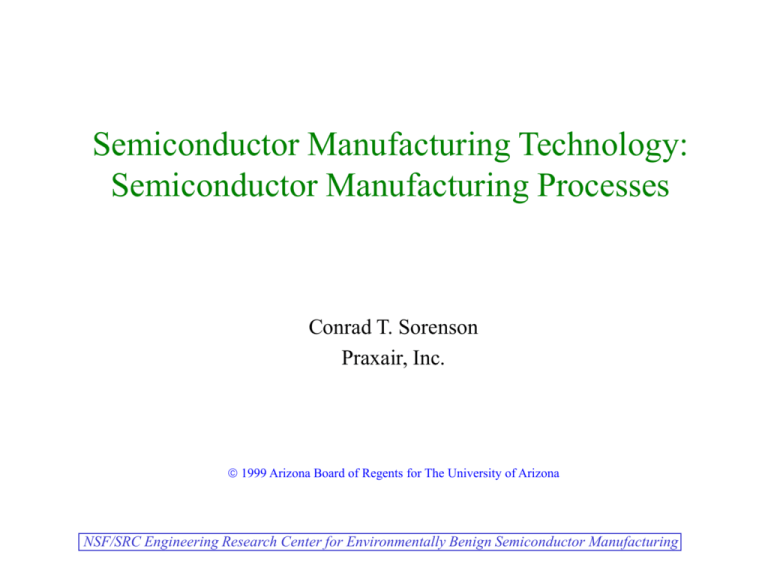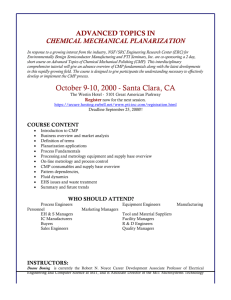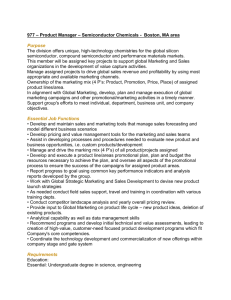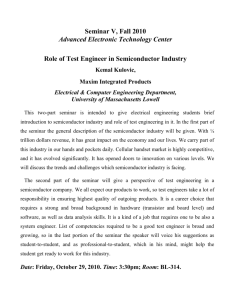Module 1: Basic Principles
advertisement

Semiconductor Manufacturing Technology: Semiconductor Manufacturing Processes Conrad T. Sorenson Praxair, Inc. 1999 Arizona Board of Regents for The University of Arizona Sorenson NSF/SRC Engineering Research Center for Environmentally Benign Semiconductor Manufacturing 1 Semiconductor Manufacturing Processes • • • • • • • • • • Design Wafer Preparation Front-end Processes Photolithography Etch Cleaning Thin Films Ion Implantation Planarization Test and Assembly Wafer Preparation Design Thin Films Front-End Processes Photolithography Ion Implantation Etch Cleaning Planarization Test & Assembly Sorenson NSF/SRC Engineering Research Center for Environmentally Benign Semiconductor Manufacturing 2 Design • • • • • Establish Design Rules Circuit Element Design Interconnect Routing Device Simulation Pattern Preparation Wafer Preparation Design Thin Films Front-End Processes Photolithography Ion Implantation Etch Cleaning Planarization Test & Assembly Sorenson NSF/SRC Engineering Research Center for Environmentally Benign Semiconductor Manufacturing 3 Pattern Preparation Reticle Chrome Pattern Pellicle Quartz Substrate Sorenson NSF/SRC Engineering Research Center for Environmentally Benign Semiconductor Manufacturing 4 Wafer Preparation • • • • Polysilicon Refining Crystal Pulling Wafer Slicing & Polishing Epitaxial Silicon Deposition Wafer Preparation Design Thin Films Front-End Processes Photolithography Ion Implantation Etch Cleaning Planarization Test & Assembly Sorenson NSF/SRC Engineering Research Center for Environmentally Benign Semiconductor Manufacturing 5 Polysilicon Refining Chemical Reactions Silicon Refining: SiO2 + 2 C Si + 2 CO Silicon Purification: Si + 3 HCl HSiCl3 + H2 Silicon Deposition: HSiCl3 + H2 Si + 3 HCl Reactants H2 Silicon Intermediates H2SiCl2 HSiCl3 Sorenson NSF/SRC Engineering Research Center for Environmentally Benign Semiconductor Manufacturing 6 Crystal Pulling Quartz Tube Rotating Chuck Process Conditions Flow Rate: 20 to 50 liters/min Time: 18 to 24 hours Temperature: >1,300 degrees C Pressure: 20 Torr Seed Crystal Growing Crystal (boule) RF or Resistance Heating Coils Materials Polysilicon Nodules * Ar * H2 Molten Silicon (Melt) Crucible * High proportion of the total product use Sorenson NSF/SRC Engineering Research Center for Environmentally Benign Semiconductor Manufacturing 7 Wafer Slicing & Polishing silicon wafer p+ silicon substrate The silicon ingot is sliced into individual wafers, polished, and cleaned. Sorenson NSF/SRC Engineering Research Center for Environmentally Benign Semiconductor Manufacturing 3/15/98 PRAX01C.PPT Rev. 1.0 8 Epitaxial Silicon Deposition silicon wafer Susceptor p- silicon epi layer Gas Input p+ silicon substrate Lamp Module Chemical Reactions Silicon Deposition: HSiCl3 + H2 Si + 3 HCl Process Conditions Flow Rates: 5 to 50 liters/min Temperature: 900 to 1,100 degrees C. Pressure: 100 Torr to Atmospheric Silicon Sources SiH4 H2SiCl2 HSiCl3 * SiCl4 * Dopants AsH3 B2H6 PH3 Etchant HCl Carriers Ar H2 * N2 Quartz Lamps Wafers Exhaust * High proportion of the total product use Sorenson NSF/SRC Engineering Research Center for Environmentally Benign Semiconductor Manufacturing 9 Front-End Processes • Thermal Oxidation • Silicon Nitride Deposition - Low Pressure Chemical Vapor Deposition (LPCVD) • Polysilicon Deposition - Low Pressure Chemical Vapor Deposition (LPCVD) • Annealing Wafer Preparation Design Thin Films Front-End Processes Photolithography Ion Implantation Etch Cleaning Planarization Test & Assembly Sorenson NSF/SRC Engineering Research Center for Environmentally Benign Semiconductor Manufacturing 10 Front-End Processes Vertical LPCVD Furnace silicon dioxide (oxide) Exhaust Via Vacuum Pumps and Scrubber p- silicon epi layer p+ silicon substrate Chemical Reactions Thermal Oxidation: Si + O2 SiO2 Nitride Deposition: 3 SiH4 + 4 NH3 Si3N4 + 12 H2 Polysilicon Deposition: SiH4 Si + 2 H2 Process Conditions (Silicon Nitride LPCVD) Flow Rates: 10 - 300 sccm Temperature: 600 degrees C. Pressure: 100 mTorr Oxidation Polysilicon Nitride Annealing Quartz Tube 3 Zone Temperature Control Ar H2 NH3 * Ar N2 N2 H2SiCl2 * He H2O SiH4 * N2 H2 Gas Inlet Cl2 AsH3 SiH4 * N2 H2 B2H6 SiCl4 HCl * PH3 * High proportion of the total product use O2 * Sorenson Dichloroethene * NSF/SRC Engineering Research Center for Environmentally Benign Semiconductor Manufacturing 11 Photolithography • Photoresist Coating Processes • Exposure Processes Wafer Preparation Design Thin Films Front-End Processes Photolithography Ion Implantation Etch Cleaning Planarization Test & Assembly Sorenson NSF/SRC Engineering Research Center for Environmentally Benign Semiconductor Manufacturing 12 Photoresist Coating Processes photoresist field oxide p- epi p+ substrate Photoresists Negative Photoresist * Positive Photoresist * Other Ancillary Materials (Liquids) Edge Bead Removers * Anti-Reflective Coatings * Adhesion Promoters/Primers (HMDS) * Rinsers/Thinners/Corrosion Inhibitors * Contrast Enhancement Materials * Developers TMAH * Specialty Developers * Inert Gases Ar N2 Sorenson NSF/SRC Engineering Research Center for Environmentally Benign Semiconductor Manufacturing 13 Exposure Processes photoresist field oxide p- epi p+ substrate Expose Kr + F2 (gas) * Inert Gases N2 Sorenson NSF/SRC Engineering Research Center for Environmentally Benign Semiconductor Manufacturing 14 Ion Implantation • Well Implants • Channel Implants • Source/Drain Implants Wafer Preparation Design Thin Films Front-End Processes Photolithography Ion Implantation Etch Cleaning Planarization Test & Assembly Sorenson NSF/SRC Engineering Research Center for Environmentally Benign Semiconductor Manufacturing 15 Ion Implantation phosphorus (-) ions junction depth Focus Beam trap and gate plate Neutral beam and beam path gated photoresist mask field oxide n-w ell p- epi p-channel transistor p+ substrate Process Conditions Flow Rate: 5 sccm Pressure: 10-5 Torr Accelerating Voltage: 5 to 200 keV Gases Ar AsH3 B11F3 * He N2 PH3 SiH4 SiF4 GeH4 Neutral beam trap and beam gate Y - axis scanner X - axis scanner Wafer in wafer process chamber Equipment Ground Resolving Aperture 180 kV Solids Ga In Sb Liquids Al(CH3)3 Acceleration Tube 90° Analyzing Magnet Terminal Ground Ion Source 20 kV * High proportion of the total product use Sorenson NSF/SRC Engineering Research Center for Environmentally Benign Semiconductor Manufacturing 16 Etch • Conductor Etch - Poly Etch and Silicon Trench Etch - Metal Etch • Dielectric Etch Wafer Preparation Design Thin Films Front-End Processes Photolithography Ion Implantation Etch Cleaning Planarization Test & Assembly Sorenson NSF/SRC Engineering Research Center for Environmentally Benign Semiconductor Manufacturing 17 Conductor Etch source-drain areas gate linew idth gate oxide p-w ell n-w ell p-channel transistor n-channel transistor p+ substrate Chemical Reactions Silicon Etch: Si + 4 HBr SiBr4 + 2 H2 Aluminum Etch: Al + 2 Cl2 AlCl4 Process Conditions Flow Rates: 100 to 300 sccm Pressure: 10 to 500 mTorr RF Power: 50 to 100 Watts Polysilicon Etches HBr * C2F6 SF6 * NF3 * O2 Aluminum Etches Cluster Tool Configuration Wafers Etch Chambers Transfer Chamber Loadlock RIE Chamber Transfer Chamber Gas Inlet Wafer RF Power BCl3 * Cl2 Diluents Ar He N2 Exhaust * High proportion of the total product use NSF/SRC Engineering Research Center for Environmentally Benign Semiconductor Manufacturing Sorenson 18 Dielectric Etch Contact locations Cluster Tool Configuration p-w ell n-w ell p-channel transistor n-channel transistor p+ substrate Wafers Chemical Reactions Oxide Etch: SiO2 + C2F6 SiF4 + CO2 + CF4 + 2 CO Process Conditions Flow Rates: 10 to 300 sccm Pressure: 5 to 10 mTorr RF Power: 100 to 200 Watts Plasma Dielectric Etches CHF3 * CF4 C2F6 C3F8 CO * CO2 O2 SF6 SiF4 Diluents Etch Chambers Transfer Chamber Loadlock RIE Chamber Transfer Chamber Ar He N2 Gas Inlet Wafer RF Power Exhaust * High proportion of the total product use Sorenson NSF/SRC Engineering Research Center for Environmentally Benign Semiconductor Manufacturing 19 Cleaning • Critical Cleaning • Photoresist Strips • Pre-Deposition Cleans Wafer Preparation Design Thin Films Front-End Processes Photolithography Ion Implantation Etch Cleaning Planarization Test & Assembly Sorenson NSF/SRC Engineering Research Center for Environmentally Benign Semiconductor Manufacturing 20 Critical Cleaning Contact locations p-w ell n-w ell p-channel transistor n-channel transistor p+ substrate 1 Process Conditions Temperature: Piranha Strip is 180 degrees C. 1 Organics H2SO4 + H2O2 H2O Rinse RCA Clean SC1 Clean (H2O + NH4OH + H2O2) * * SC2 Clean (H2O + HCl + H2O2) * Piranha Strip * H2SO4 + H2O2 * Nitride Strip H3PO4 * Oxide Strip HF + H2O * 2 2 Oxides HF + H2O H2O Rinse Dry Strip N2O O2 CF4 + O2 O3 3 4 3 Particles 4 Metals NH4OH + HCl + H2O2 + H2O H2O2 + H2O H2O Rinse H2O Rinse 5 5 Dry H2O or IPA + N2 Solvent Cleans NMP Proprietary Amines (liquid) Dry Cleans HF O2 Plasma Alcohol + O3 NSF/SRC Engineering Research Center for Environmentally Benign Semiconductor Manufacturing Sorenson 21 Thin Films • Chemical Vapor Deposition (CVD) Dielectric • CVD Tungsten • Physical Vapor Deposition (PVD) • Chamber Cleaning Wafer Preparation Design Thin Films Front-End Processes Photolithography Ion Implantation Etch Cleaning Planarization Test & Assembly Sorenson NSF/SRC Engineering Research Center for Environmentally Benign Semiconductor Manufacturing 22 Chemical Vapor Deposition (CVD) Dielectric Metal 1 insulator layer 2 p-w ell n-w ell p-channel transistor n-channel transistor p+ substrate Metering Pump Inert Mixing Gas TEOS Source Chemical Reactions Si(OC2H5)4 + 9 O3 SiO2 + 5 CO + 3 CO2 + 10 H2O Process Conditions (ILD) Flow Rate: 100 to 300 sccm Pressure: 50 Torr to Atmospheric Vaporizer Direct Liquid Injection LPCVD Chamber CVD Dielectric O2 O3 TEOS * TMP * Transfer Chamber Process Gas Gas Inlet Wafer RF Power Exhaust * High proportion of the total product use Sorenson NSF/SRC Engineering Research Center for Environmentally Benign Semiconductor Manufacturing 23 Chemical Vapor Deposition (CVD) Tungsten titanium tungsten Input Cassette p-w ell n-w ell p-channel transistor n-channel transistor p+ substrate Chemical Reactions WF6 + 3 H2 W + 6 HF Process Conditions Flow Rate: 100 to 300 sccm Pressure: 100 mTorr Temperature: 400 degrees C. CVD Dielectric WF6 * Ar H2 N2 Output Cassette Wafer Hander Wafers Multistation Sequential Deposition Chamber Water-cooled Showerheads Resistively Heated Pedestal * High proportion of the total product use Sorenson NSF/SRC Engineering Research Center for Environmentally Benign Semiconductor Manufacturing 24 Physical Vapor Deposition (PVD) Physical Vapor Deposition Chambers Cluster Tool Configuration p-w ell n-w ell p-channel transistor n-channel transistor p+ substrate Process Conditions Pressure: < 5 mTorr Temperature: 200 degrees C. RF Power: Wafers Transfer Chamber Loadlock Reactive Gases PVD Chamber N Barrier Metals SiH4 Ar N2 N2 Ti PVD Targets * Transfer Chamber Argon & Nitrogen S N Cryo Pump e+ Wafer Backside DC Power He Cooling Supply (+) * High proportion of the total product use Sorenson NSF/SRC Engineering Research Center for Environmentally Benign Semiconductor Manufacturing 25 Chamber Cleaning Multistation Sequential Deposition Chamber Water-cooled Showerheads Resistively Heated Pedestal Chemical Reactions Oxide Etch: SiO2 + C2F6 SiF4 + CO2 + CF4 + 2 CO Process Conditions Flow Rates: 10 to 300 sccm Pressure: 10 to 100 mTorr RF Power: 100 to 200 Watts Aluminum Surface Coating Chamber Cleaning C2F6 * NF3 ClF3 Process Material Residue Chamber Wall Cross-Section * High proportion of the total product use Sorenson NSF/SRC Engineering Research Center for Environmentally Benign Semiconductor Manufacturing 26 Planarization • Oxide Planarization • Metal Planarization Wafer Preparation Design Thin Films Front-End Processes Photolithography Ion Implantation Etch Cleaning Planarization Test & Assembly Sorenson NSF/SRC Engineering Research Center for Environmentally Benign Semiconductor Manufacturing 27 Chemical Mechanical Planarization (CMP) Platen Head Sweep Slide p-w ell n-w ell p-channel transistor n-channel transistor p+ substrate Load/Unload Station Process Conditions (Oxide) Flow: 250 to 1000 ml/min Wafer Handling Robot & I/O Particle Size: 100 to 250 nm Concentration: 10 to 15%, 10.5 to 11.3 pH Process Conditions (Metal) Flow: 50 to 100 ml/min Wafer Particle Size: 180 to 280 nm Carrier Concentration: 3 to 7%, 4.1 - 4.4 pH Backing (Carrier) Film CMP (Oxide) Polyurethane Pad Polyurethane Pad Conditioner Abrasive Silica Slurry * KOH * NH4OH H2O CMP (Metal) Polishing Head Pad Conditioner Carousel Polishing Pad Slurry Delivery Wafer Platen Alumina * * High proportion of the total product use. Sorenson FeNO3 NSF/SRC Engineering Research Center for Environmentally Benign Semiconductor Manufacturing 28 Test and Assembly • • • • Electrical Test Probe Die Cut and Assembly Die Attach and Wire Bonding Final Test Wafer Preparation Design Thin Films Front-End Processes Photolithography Ion Implantation Etch Cleaning Planarization Test & Assembly Sorenson NSF/SRC Engineering Research Center for Environmentally Benign Semiconductor Manufacturing 29 Electrical Test Probe bonding pad nitride Metal 2 p-well n-well n-channel transistor p-channel transistor p+ substrate Defective IC Individual integrated circuits are tested to distinguish good die from bad ones. Sorenson NSF/SRC Engineering Research Center for Environmentally Benign Semiconductor Manufacturing 30 Die Cut and Assembly Good chips are attached to a lead frame package. Sorenson NSF/SRC Engineering Research Center for Environmentally Benign Semiconductor Manufacturing 31 Die Attach and Wire Bonding lead frame gold wire bonding pad connecting pin Sorenson NSF/SRC Engineering Research Center for Environmentally Benign Semiconductor Manufacturing 32 Final Test Chips are electrically tested under varying environmental conditions. Sorenson NSF/SRC Engineering Research Center for Environmentally Benign Semiconductor Manufacturing 33 References 1. 2. 3. 4. 5. 6. 7. 8. CMOS Process Flow in Wafer Fab, Semiconductor Manufacturing Technology, DRAFT, Austin Community College, January 2, 1997. Semiconductor Processing with MKS Instruments, Inc. Worthington, Eric. “New CMP architecture addresses key process issues,” Solid State Technology, January 1996. Leskonic, Sharon. “Overview of CMP Processing,” SEMATECH Presentation, 1996. Gwozdz, Peter. “Semiconductor Processing Technology” SEMI, 1997. CVD Tungsten, Novellus Sales Brochure, 7/96. Fullman Company website. “Fullman Company - The Semiconductor Manufacturing Process,” http://www.fullman.com/semiconductors/index.html, 1997. Barrett, Craig R. “From Sand to Silicon: Manufacturing an Integrated Circuit,” Scientific American Special Issue: The Solid State Century, January 22, 1998. Sorenson NSF/SRC Engineering Research Center for Environmentally Benign Semiconductor Manufacturing 34


